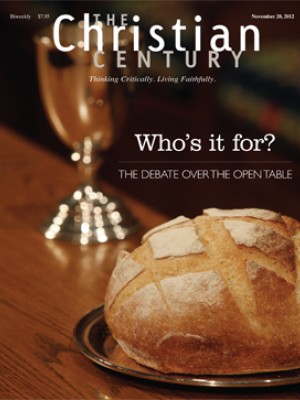Advent 1C: Jeremiah 33:14-16; Luke 21:25-36
When Advent comes, I worry, agonize and cry. Advent is daunting. Advent is my Everest. That’s why this year I’ve decided to add humor. I’ve taped a greeting card above my computer. On it is a cat offering the card’s recipient a gesture of love—in its paws it holds a heart-shaped hairball. When I’m wrestling with an Advent sermon and losing, this cartoon will explain why. The problem is that I’m working with a hairball of Advent scriptural phrases.
Once again I read the account of “distress among nations confused by the roaring of the sea and the waves.” Once again I react—both personally and as a pastor thinking of my congregation—to ominous forecasts that speak of people fainting “from fear and foreboding of what is coming upon the world.” People are fainting, heavens are shaking, and there is fear and foreboding in abundance—how am I to shape all of this into something that the congregation will find charming (and that won’t lead to the loss of my 3 percent cost-of-living increase)?
Read our latest issue or browse back issues.
Advent scriptures are unapologetically crude. Their prophetic barking and guttural slings make me feel spat upon. My personal context is to blame for this oversensitivity. I’m feeling fairly normal right now, fairly pulled-together. My family is healthy. My employment at church seems solid—knock on wood. My phone is ringing a modest number of times with modest news. My wardrobe is working. In ordinary times such as this, when my family is afloat on a sea of relative stability, the bellicose and crass war cries of Advent are incomprehensible to me. They come off as misplaced, misanthropic rants, to which I’m tempted to reply, “You can’t mean me. If, by chance, you can and do mean me, your anger is disproportionate to my peccadillo.”
At other times, however, when my life is not so mild, my reaction to these apocalyptic interruptions is quite different. When my son was two years old, I was nominated to deliver the sermon for the ecumenical Thanksgiving Eve service. On the cold, drizzly afternoon of the service, I received a phone call. The black leather pumps that I’d ordered from my favorite shoe store in Iowa City had arrived. I was the new pastor in town, and I wanted to impress my clergy peers with those new shoes. If I really stepped on it, I could get to Iowa City, pick up the shoes and get back in time to preach. Instead, I ended up in a car wreck.
In a November’s freezing rain, a semitrailer stopped behind us. Its headlights blasted into our car, showing me the broken glass and blood around us. As the truck driver lifted us into his rig I remember thinking, “Something had better interrupt this scene, and it’d better be immediate, and it’d better be big.” Traffic wound its way around us. I worried for my son’s life. Finally we heard sirens. The discordant, high-pitched screeching came at us like a symphony. Only in this and in a handful of other traumatic circumstances in my life have I heard something akin to an Advent invasion as it was intended to be—those sirens were Good News with capital letters.
My son, who was terribly injured, survived and is thriving at 20, with one false tooth to remind him of that day. The people in the van in front of me were traumatized but unhurt. As personal penance, I wore the shoes until they curled up like the witch’s slippers found under Dorothy’s house in Munchkinland.
As for my car, it was beyond saving. When I went to see it and recover a few items, I realized that a cassette was still stuck in the player—a cassette that I valued. I pressed the eject button. I turned a spare key in the ignition, stuck the key into the player and poked at the cassette. Nothing. Then, while I was draped over the seat picking up pacifiers from the backseat floor, Paul Simon’s voice suddenly burst onto the scene singing, “I believe in the future!” It was prophetic and clear. I jerked my head up and heard a buzz and click as the cassette popped out of the player. I’m sure there’s a mechanical explanation for the cassette’s full-blast broadcast and sudden exit from the player, but I don’t want one.
Now, years later, when I worry about creating a sermon that can turn the shouts of Luke 21 into gospel goodness, I think about that night, and it gets me in touch with the beauty of a rescue. “The days are surely coming,” we read in Jeremiah, when the Lord “will cause a righteous branch to spring up . . . and Judah will be saved and Jerusalem will live in safety.”
But until that day many of us will struggle with fear, distress and even fainting. We can turn to Paul, who directs us to live the hope of Advent rescue every day, day after day. “Devote yourselves to prayer, keeping alert in it with thanksgiving. . . . [Make] the most of the time.”
And still there will be moments of the most urgent, painful distress, those moments when rescue seems impossible. I look back on our family’s close call and remember how desperately I awaited those flashing lights and screaming sirens.
Then, even if I will be trying once again to enchant my congregation with heart-shaped hairballs, I’m grateful for that prophetic voice that resists my attempts to decode and tame it. Someone out there is in deep distress this Advent—and needs to hear the full siren.






